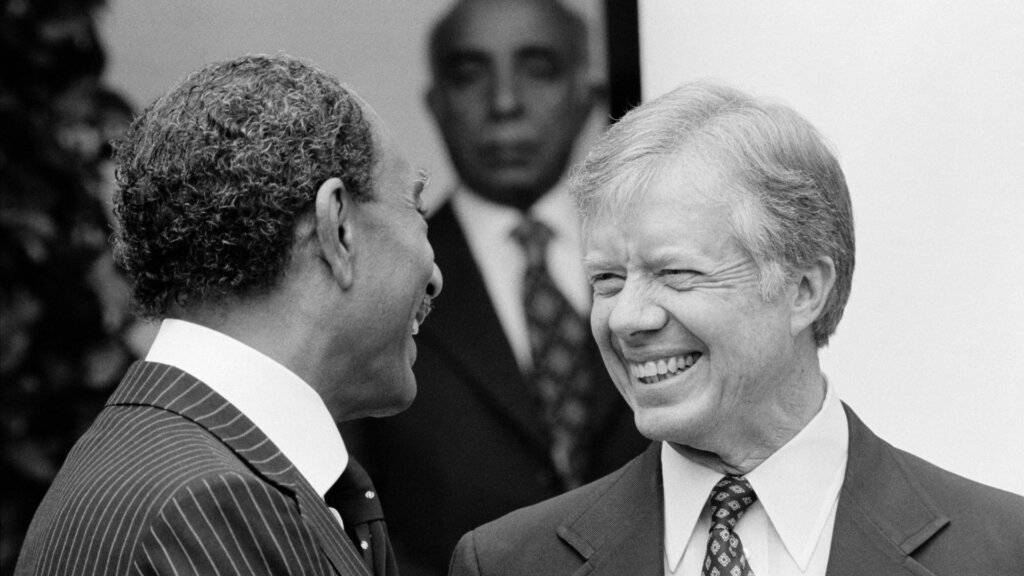When I was in my twenties, I lived in Northern Virginia and attended NOVA. During that time, Jimmy and Rosalyn Carter were in the White House. I had the good fortune to tour the White House, I am still amazed at the graciousness of this couple. Do you know that Rosalyn gave dinner for the area artists and the place settings were crafted, each from a different artist? I observed these place settings displayed in the Smithsonian. It was a time of hope, and a brighter future. I have long admired this couple from afar and am so honored to have lived in their time.
Early Life and Education
James Earl Carter Jr., known to the world as Jimmy Carter, was born on October 1, 1924, in the small town of Plains, Georgia. Growing up in a rural setting, he was deeply influenced by his family’s values and the close-knit community around him. His father, James Earl Carter Sr., was a successful local businessman, while his mother, Bessie Lillian Gordy, was a registered nurse who instilled in him a sense of compassion and service.
Carter’s early education took place in the public schools of Plains, where he excelled academically. His ambition and dedication led him to the U.S. Naval Academy in Annapolis, Maryland, from which he graduated in 1946. This period of his life clearly shows discipline and a commitment to public service, traits that would define his future career.
Naval Service and Return to Georgia
After graduating from the Naval Academy, Carter embarked on a career in the U.S. Navy, serving as a submariner. His naval service took him to various parts of the world, providing him with a broader perspective on global affairs. However, in 1953, following the death of his father, Carter resigned from the Navy and returned to Plains to manage the family peanut farm.
This return to his roots was a pivotal moment in Carter’s life. He modernized the farm operations and became deeply involved in the local community, which laid the groundwork for his entry into politics. His experiences as a farmer and businessman gave him a unique understanding of the challenges faced by rural Americans, shaping his political philosophy.
Entry into Politics: Georgia State Senate and Governorship
With his election into the Georgia State Senate, Carter’s political career began in earnest in 1962. During his tenure, he focused on issues such as education, civil rights, and government efficiency. His efforts to improve the state’s education system and promote racial integration were particularly noteworthy, reflecting his progressive stance on social issues.
In 1970, Carter became Governor of Georgia. As governor, he continued to champion civil rights and education reform. He also implemented significant changes in the state’s government structure, promoting transparency and efficiency. His tenure as governor shows a commitment to social justice and a vision for a more inclusive society.
Presidential Campaign and Election
Carter’s success as governor propelled him onto the national stage. In 1976, he announced his candidacy for the presidency, running as a Democrat. His campaign emphasized honesty, integrity, and a promise to restore trust in government following the Watergate scandal. Carter’s outsider status and his focus on human rights resonated with voters, leading to his narrow victory over incumbent President Gerald Ford.
The Jimmy Carter Presidency: Achievements and Challenges
Carter’s presidency, from 1977 to 1981, was a period of significant achievements and formidable challenges. Domestically, he focused on energy conservation and environmental protection, establishing the Department of Energy and the Department of Education. His administration also implemented policies aimed at reducing the nation’s dependence on foreign oil and promoting renewable energy sources.

One of Carter’s most notable achievements was the Camp David Accords, a historic peace agreement between Israel and Egypt brokered in 1978. This diplomatic success earned him international acclaim and demonstrated his commitment to peaceful conflict resolution. Additionally, Carter negotiated the Panama Canal Treaties, which transferred control of the Panama Canal to Panama, further showcasing his dedication to international diplomacy.
However, Carter’s presidency also shows significant challenges. The U.S. economy faced stagflation, a combination of high inflation and unemployment, which proved difficult to address. The energy crisis of the late 1970s exacerbated these economic woes, leading to widespread dissatisfaction among the American public.
The Iran Hostage Crisis, which began in 1979, was another major challenge for Carter’s administration. The prolonged captivity of 52 American hostages in Iran dominated the final year of his presidency and contributed to his defeat in the 1980 election by Ronald Reagan. However, the release date for the hostages was January 20, 1981, minutes after Ronald Reagan’s inauguration as the 40th President of the United States
Post-Presidency: Humanitarian Work and Global Impact
After leaving office, Carter did not retreat from public life. Instead, he dedicated himself to humanitarian work and global advocacy. In 1982, he founded the Carter Center, a non-profit organization aimed at promoting human rights, democracy, and global health. The Center’s initiatives have had a profound impact on issues such as disease eradication, election monitoring, and conflict resolution.
Carter’s commitment to humanitarian causes extended to his involvement with Habitat for Humanity, an organization that builds affordable housing for those in need. His hands-on participation in building projects around the world highlighted his dedication to service and his belief in the power of community action.
In recognition of his efforts in international conflict resolution and human rights, Carter received the Nobel Peace Prize in 2002. This prestigious honor underscored his enduring legacy as a champion of peace and justice.
Authorship and Public Speaking
Throughout his post-presidential years, Carter has been a prolific author, writing numerous books on a wide range of topics, including his memoirs, political philosophy, and reflections on faith. His writings provide valuable insights into his life, beliefs, and the principles that have guided his actions.
Carter has also been an active public speaker, sharing his experiences and advocating for causes close to his heart. His speeches and public appearances have inspired many and reinforced his reputation as a thoughtful and compassionate leader.
Legacy and Longevity
As of 2025, Jimmy Carter was 100 years old, making him the longest-lived U.S. president. His longevity is a testament to his resilience and vitality. Carter’s life and career have left an indelible mark on American history and global affairs.
Carter’s legacy is multifaceted. We remember him not only for his presidency but also for his extraordinary contributions to humanitarian causes and his unwavering commitment to peace and justice. His work with the Carter Center and Habitat for Humanity has improved the lives of countless individuals around the world.
In reflecting on Carter’s life, it is clear that his impact extends far beyond his time in office. His dedication to service, his advocacy for human rights, and his efforts to promote global peace have made him a revered figure in both American and international contexts.
Conclusion
Jimmy Carter’s journey from a peanut farmer in Georgia to a Nobel Laureate and global humanitarian is a remarkable story of dedication, service, and resilience. His life exemplifies the power of compassion and the importance of striving for a better world. As we look back on his legacy, we see the profound difference one individual can make through a commitment to justice, peace, and the well-being of others.
Peace and love to you all. Thank you for reading.









































